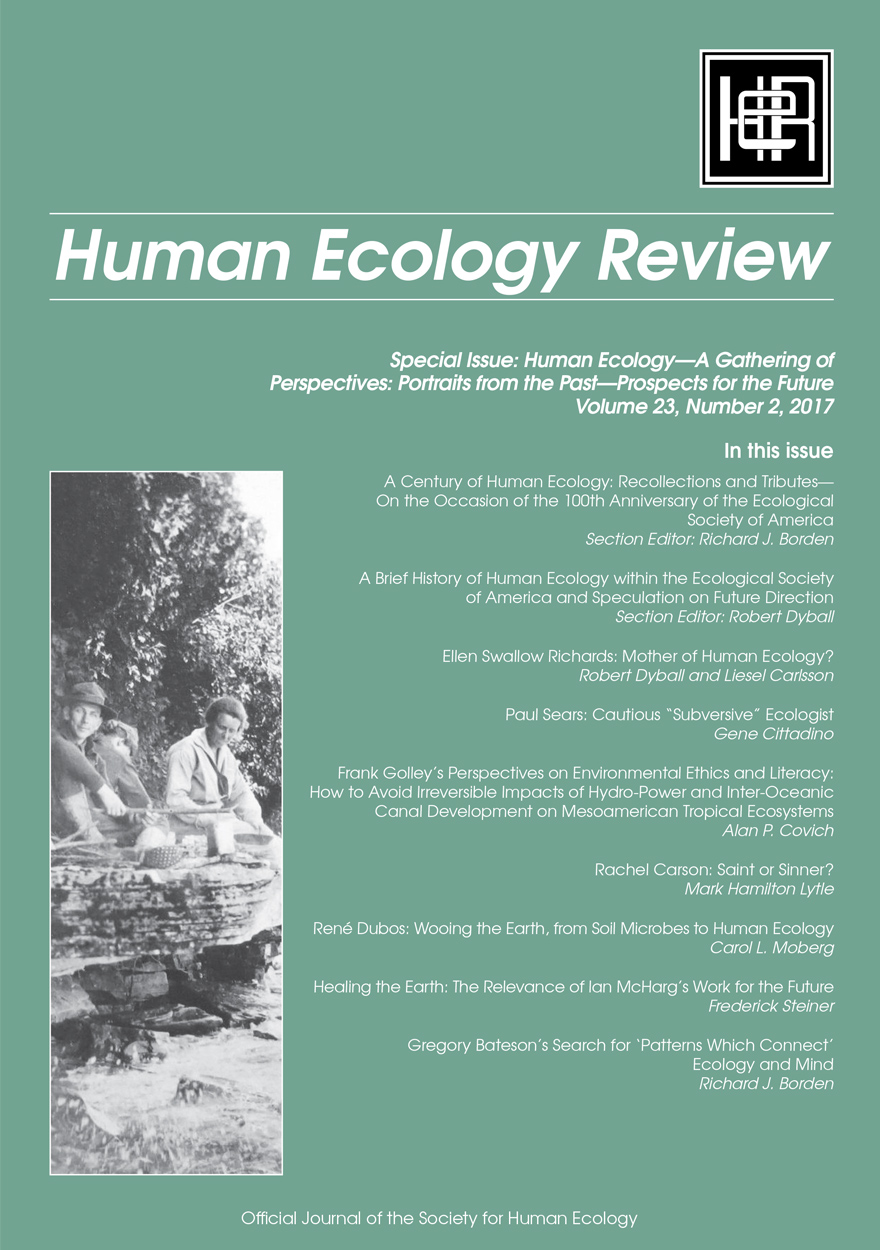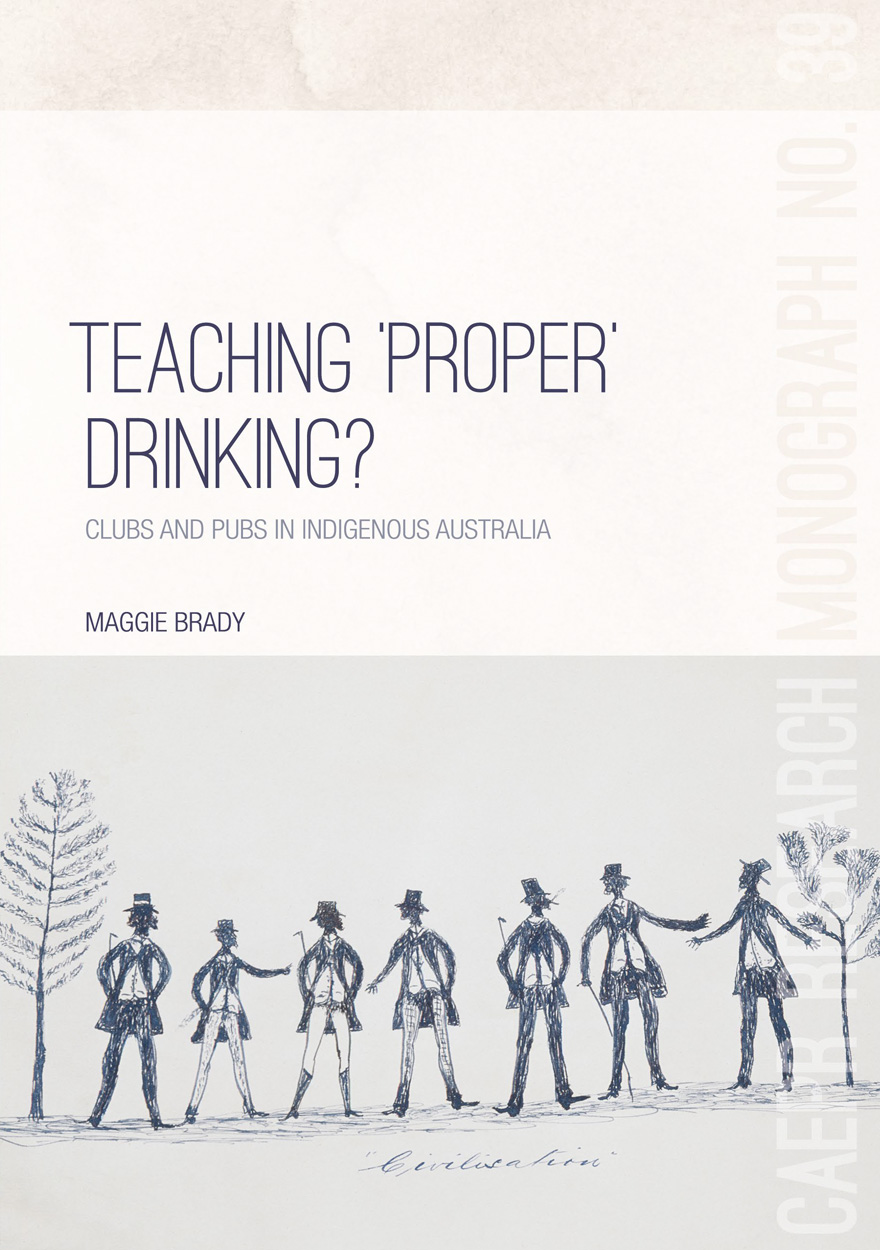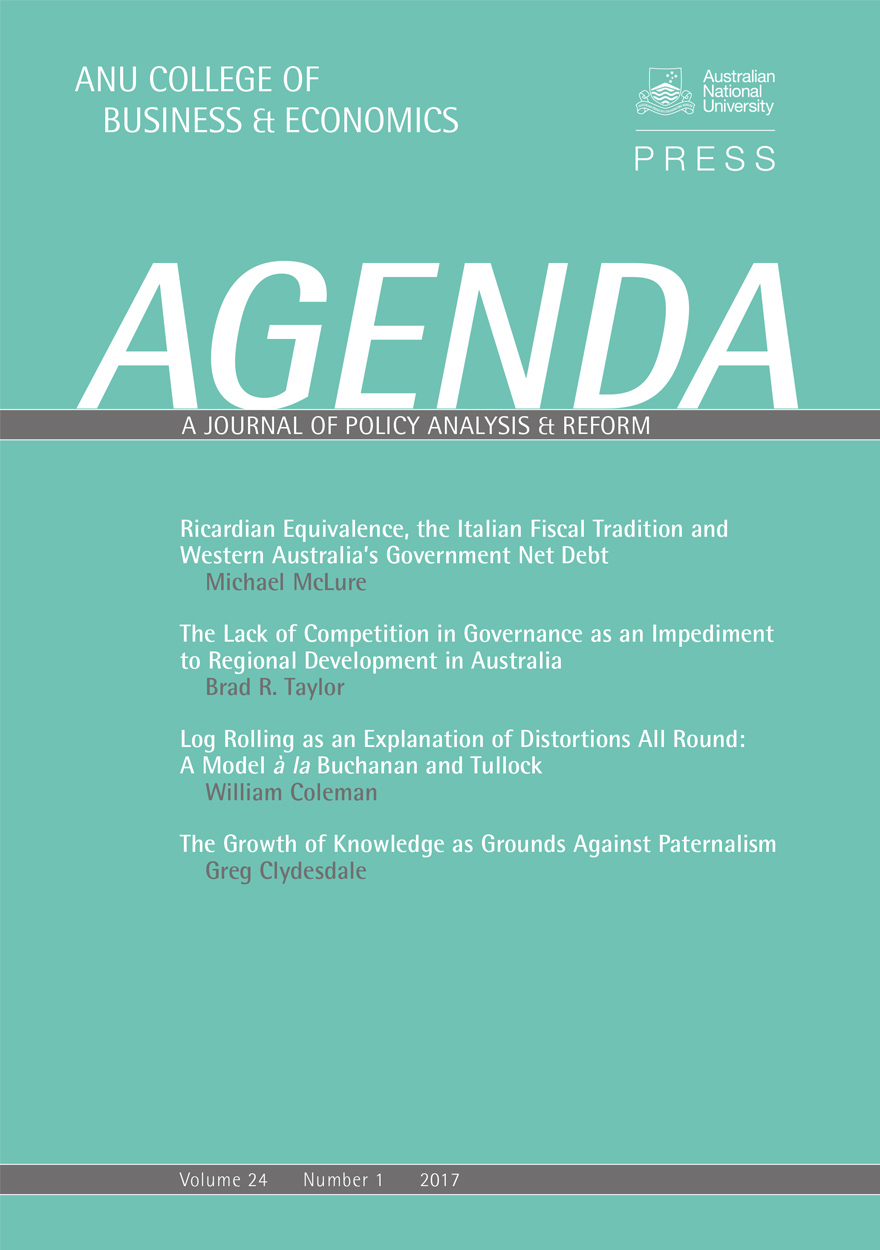Textbooks
Browse or search textbooks or find out more about the publications' authors. Download the ebook for free or buy a print-on-demand copy.
Displaying results 371 to 380 of 2630.

Aboriginal History Journal: Volume 41 »
Edited by: Ingereth Macfarlane, Liz Conor
Publication date: December 2017
The articles in Volume 41 bring to light historical sources from the colonial frontier in Tasmania (Nicholas Brodie and Kristyn Harman) and South Australia (Skye Kirchauff) to provoke reassessments of colonial attitudes and expectations. Karen Hughes brings into focus little-known, intimate aspects of Indigenous women’s experience with African American servicemen on the World War II Australian home front. Diana Young’s study of accounts of Pitjantjatjara women’s careful productions in the Ernabella craft rooms in the mid-twentieth century deepens our understanding of a relatively neglected aspect of the art history of ‘first generation, postcontact Indigenous art-making among Australian Western Desert peoples’. Nikita Vanderbyl explores records of tourists’ visits to Aboriginal reserves in the late 1800s and early 1900s, focusing on the emotive aspects of the visits, and making the links between such tourism and colonialism. Janice Newton provides a close examination of the cross-cultural signs implicated in a documented ceremonial performance in early Port Phillip. Heather Burke, Lynley Wallis and their collaborators compare a reconstructed stone building in Richmond, Queensland, with other reputedly fortified structures, and find that the historical and structural evidence for this interpretation are equivocal, pointing to imaginaries of the violent frontier as much as tangible experience.
Aboriginal History Inc. is a publishing organisation based in the Australian Centre for Indigenous History, Research School of Social Sciences, The Australian National University, Canberra.
For more information on Aboriginal History Inc. please visit aboriginalhistory.org.au.
Download for free
Not available for purchase

Human Ecology Review: Volume 23, Number 2 »
Special Issue: Human Ecology—A Gathering of Perspectives: Portraits from the Past—Prospects for the Future
Publication date: December 2017
Human Ecology Review is a semi-annual journal that publishes peer-reviewed interdisciplinary research on all aspects of human–environment interactions (Research in Human Ecology). The journal also publishes essays, discussion papers, dialogue, and commentary on special topics relevant to human ecology (Human Ecology Forum), book reviews (Contemporary Human Ecology), and letters, announcements, and other items of interest (Human Ecology Bulletin). Human Ecology Review also publishes an occasional paper series in the Philosophy of Human Ecology and Social–Environmental Sustainability.
Download for free
Not available for purchase

Teaching ‘Proper’ Drinking? »
Clubs and pubs in Indigenous Australia
Authored by: Maggie Brady
Publication date: December 2017
In Teaching ‘Proper’ Drinking?, the author brings together three fields of scholarship: socio-historical studies of alcohol, Australian Indigenous policy history and social enterprise studies. The case studies in the book offer the first detailed surveys of efforts to teach responsible drinking practices to Aboriginal people by installing canteens in remote communities, and of the purchase of public hotels by Indigenous groups in attempts both to control sales of alcohol and to create social enterprises by redistributing profits for the community good. Ethnographies of the hotels are examined through the analytical lens of the Swedish ‘Gothenburg’ system of municipal hotel ownership.
The research reveals that the community governance of such social enterprises is not purely a matter of good administration or compliance with the relevant liquor legislation. Their administration is imbued with the additional challenges posed by political contestation, both within and beyond the communities concerned.
‘The idea that community or government ownership and management of a hotel or other drinking place would be a good way to control drinking and limit harm has been commonplace in many Anglophone and Nordic countries, but has been less recognised in Australia. Maggie Brady’s book brings together the hidden history of such ideas and initiatives in Australia … In an original and wide-ranging set of case studies, Brady shows that success in reducing harm has varied between communities, largely depending on whether motivations to raise revenue or to reduce harm are in control.’
— Professor Robin Room, Director, Centre for Alcohol Policy Research, La Trobe University
In the Media
Read the Alice Spring News article: ‘Proper’ drinking: elusive goal but how hard have we tried?
Awards
Shortlisted – 2019 Chief Minister's Northern Territory History Book Award

Crown and Sword »
Executive power and the use of force by the Australian Defence Force
Authored by: Cameron Moore
Publication date: November 2017
The Australian Defence Force, together with military forces from a number of western democracies, have for some years been seeking out and killing Islamic militants in Iraq, Syria and Afghanistan, detaining asylum seekers for periods at sea or running the judicial systems of failed states. It has also been ready to conduct internal security operations at home. The domestic legal authority cited for this is often the poorly understood concept of executive power, which is power that derives from executive and not parliamentary authority. In an age of legality where parliamentary statutes govern action by public officials in the finest detail, it is striking that these extreme exercises of the use of force often rely upon an elusive legal basis. This book seeks to find the limits to the exercise of this extraordinary power.

Multi-level Governance »
Conceptual challenges and case studies from Australia
Edited by: Katherine A. Daniell, Adrian Kay
Publication date: November 2017
Important policy problems rarely fit neatly within existing territorial boundaries. More difficult still, individual governments or government departments rarely enjoy the power, resources and governance structures required to respond effectively to policy challenges under their responsibility. These dilemmas impose the requirement to work with others from the public, private, non-governmental organisation (NGO) or community spheres, and across a range of administrative levels and sectors. But how? This book investigates the challenges—both conceptual and practical—of multi-level governance processes. It draws on a range of cases from Australian public policy, with comparisons to multi-level governance systems abroad, to understand factors behind the effective coordination and management of multi-level governance processes in different policy areas over the short and longer term. Issues such as accountability, politics and cultures of governance are investigated through policy areas including social, environmental and spatial planning policy.
The authors of the volume are a range of academics and past public servants from different jurisdictions, which allows previously hidden stories and processes of multi-level governance in Australia across different periods of government to be revealed and analysed for the first time.

Researching functional ecology in Kosciuszko National Park »
Edited by: Hannah Zurcher, Ming-Dao Chia, Michael Whitehead, Adrienne Nicotra
Publication date: November 2017
Take 30 undergraduates and 20 experts from the Research School of Biology at The Australian National University, and put them together for 10 days in the high-altitude environment of Kosciuszko National Park in the Australian Alps. Challenge them to first identify research questions of potential importance to the survival of one of Australia’s unique ecosystems under threat from climate change, and then to answer those questions in scientifically rigorous and competent ways.
The successful outcomes of this challenge are evidenced in this volume of selected and fully peer-reviewed papers. They are all written by students who—after intense pre-field preparation—isolated intriguing research questions, postulated hypotheses, collected and analysed data, and interpreted their findings in the context of functional ecology theoretical frameworks and empirical evidence in the scientific literature. The experts acted as guides and supporters rather than lead researchers, so that the students—most of whom were at the end of their first year of studies—were all tasked with fully realising the concept of self-actuated research.
This book has much to offer ecologists, plant and animal scientists, protected area managers and anyone else interested in knowing more about the species of Kosciuszko National Park and how they live, survive, behave and interact. This book is also a showcase of just how much can be accomplished by bright and enthusiastic students who are trusted and guided to use their scientific and ecological knowledge and skills immediately. Much of the knowledge made available in these papers would simply not have seen the light of day except for this innovative intensive approach to research-based education. It is reassuring to know that the future of ecological research is in such capable hearts and minds!

Tax, Social Policy and Gender »
Rethinking equality and efficiency
Edited by: Miranda Stewart
Publication date: November 2017
Gender inequality is profoundly unjust and in clear contradiction to the philosophy of the ‘fair go’. In spite of some action by recent governments, Australia has fallen behind in policy and outcomes, even as the G20 group of nations, the Organisation for Economic Co-operation and Development and the International Monetary Fund are paying renewed attention to gender inequality.
Tax, Social Policy and Gender presents new research on entrenched gender inequality in a comparative framework of human rights and fiscal sustainability. Ground-breaking empirical studies examine unequal returns to education for women and men, decision-making about child care by fathers and mothers, the history and gendered effects of the income tax and family payments, and women in the top 1 per cent. Contributors demonstrate how Australia’s tax, social security, child care, parental leave, education, work and retirement income policies intersect to compound gender inequality.
Tax, Social Policy and Gender calls for a rethinking of equality and efficiency in tax and social policy and provides new policy solutions. It offers a pathway to achieve gender mainstreaming for women’s economic security and the wellbeing of all Australians.

Navigating Boundaries »
The Asian diaspora in Torres Strait
Edited by: Anna Shnukal, Guy Ramsay, Yuriko Nagata
Publication date: November 2017
Navigating Boundaries belongs to a new generation of Asian–Australian historical studies. The essays presented here draw on an extensive, widely dispersed body of information, including much unpublished material, in order to narrate stories of the Asian diaspora communities of Torres Strait, north Queensland. Early chapters give an overview of Torres Strait Islander/Asian/European interaction, documenting the experiences of people from the five major Asian communities in the Torres Strait: Chinese, Filipino, Indonesian, Japanese and Sri Lankan. Later chapters inspect the early authorities of Torres Strait, including the former Resident Magistrate and the Protector of Aboriginals. Other chapters examine the contributions to Torres Strait culture made by Asian communities—from ethnic identity, clothing and cuisine, to religion, funeral and burial practices, and with a strong focus on the rich musical culture of Torres Strait Islanders. In the final chapter of the book, a variety of local voices narrate stories of Torres Strait people of Asian ancestry, providing a deeply personal insight into the Asian experience in Torres Strait.

Agenda - A Journal of Policy Analysis and Reform: Volume 24, Number 1, 2017 »
Edited by: William Coleman
Publication date: November 2017
Agenda is a refereed, ECONLIT-indexed and RePEc-listed journal of the College of Business and Economics, The Australian National University. Launched in 1994, Agenda provides a forum for debate on public policy, mainly (but not exclusively) in Australia and New Zealand. It deals largely with economic issues but gives space to social and legal policy and also to the moral and philosophical foundations and implications of policy.
Subscribe to the Agenda Alerting service if you wish to be advised on forthcoming or new issues.
Download for free
Not available for purchase

The Archaeology of Rock Art in Western Arnhem Land, Australia »
Publication date: November 2017
Western Arnhem Land, in the Top End of Australia’s Northern Territory, has a rich archaeological landscape, ethnographic record and body of rock art that displays an astonishing array of imagery on shelter walls and ceilings. While the archaeology goes back to the earliest period of Aboriginal occupation of the continent, the rock art represents some of the richest, most diverse and visually most impressive regional assemblages anywhere in the world. To better understand this multi-dimensional cultural record, The Archaeology of Rock Art in Western Arnhem Land, Australia focuses on the nature and antiquity of the region’s rock art as revealed by archaeological surveys and excavations, and the application of novel analytical methods. This volume also presents new findings by which to rethink how Aboriginal peoples have socially engaged in and with places across western Arnhem Land, from the north to the south, from the plains to the spectacular rocky landscapes of the plateau. The dynamic nature of Arnhem Land rock art is explored and articulated in innovative ways that shed new light on the region’s deep time Aboriginal history.



